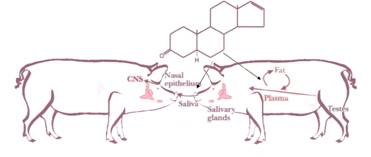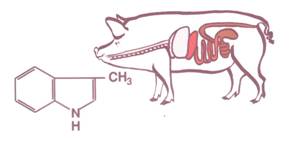Key messages
Nearly all male piglets in European countries are surgically castrated without the use of painkillers. The procedure is criticized mainly on the grounds of animal welfare reasons.
The main reason for castration is that a proportion of male piglets develop boar taint - an unpleasant flavour and odour caused by the substances androstenone and skatole, which are stored in the fat tissues of sexually mature pigs
It has been shown that, if the problem with boar taint can be resolved, the production of entire male pigs is preferable in many ways to the production of castrated male pigs. Besides the animal welfare benefits, there are economic advantages associated with pig production based on entire male pigs, primarily because these animals have higher feed conversion and production is less labour-intensive.
The risk of aggressive behaviour among pigs, and the meat quality problems caused by fighting, can be reduced by lowering slaughter weight and age (as practised in the UK) and by keeping pigs in intact groups with as little mixing as possible and preferably none at all from one week after weaning (as the Regulation already stipulates).
An alternative to the surgical castration of pigs is immunocastration, which reduces the risk of boar taint at the same time as reducing aggression, but this methodology has been criticized and it is uncertain whether the European consumer will accept it.
A risk-based testing system has been discussed. The risk analysis could be based on age, weight, genetics, feeding and management and lead to on-line testing of high-risk animals. A risk-based system needs to be analysed further.
Androstenone

Skatole
